press release, 23. August 2018
"German Environmental Award" for Leipzig Team of Experts
Decentralised wastewater management implemented in Jordan
Two environmental bio-technologists Prof. Roland A. Müller and Dr. Manfred van Afferden as well as economist Dr. Mi-Yong Lee, all scientists at the Helmholtz Centre for Environmental Research (UFZ), alongside Wolf-Michael Hirschfeld, initiator of the Training and Demonstration Centre for Decentralized Sewage Treatment (BDZ) wastewater jointly receive the German Environmental Award from the German Federal Environmental Foundation (DBU). The interdisciplinary team succeeded in developing principles for a decentralised wastewater solution and for implementing it politically in Jordan. The Leipzig-based team of experts shares the environmental prize amount of €500,000 with marine biologist Prof. Antje Boetius. Federal President Frank-Walter Steinmeier will present the award in Erfurt on 28 October.
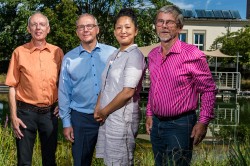
Photo: André Künzelmann, UFZ
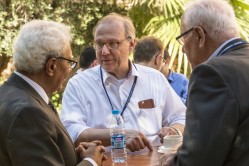
Photo: André Künzelmann, UFZ
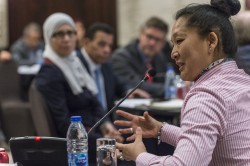
Photo: André Künzelmann, UFZ
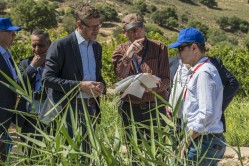
Photo: André Künzelmann, UFZ
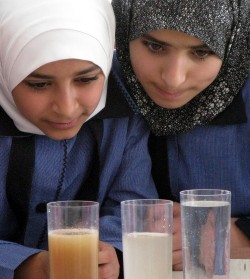
Photo: UFZ
Drinking water is polluted with faeces for around two billion people worldwide. At the same time, only 20% of wastewater worldwide is properly disposed of and treated. In the rural areas of Jordan alone, annually 45 million cubic metres of wastewater that has not been treated at all or has been treated inadequately reaches groundwater. The prize-winning team has been working in Jordan since 2006 as part of the research group on integrated water resource management funded by the Federal Ministry of Education and Research (BMBF), and focusing on groundwater protection by treating and reusing wastewater. They have developed a system approach that complements the central sewer network with flexible decentralised solutions. This innovative approach significantly improves the protection of groundwater from pollutants and pathogens while also reducing the consumption of fresh water, e.g. in agriculture.
"In a unique project in Jordan, the Leipzig-based team of experts has demonstrated how water scarcity can be successfully overcome in the most seriously affected countries with a holistic, innovative approach. It has set the course for a better future in which the majority of the population of Jordan has access to clean drinking water and wastewater is purified efficiently," comments Prof. Otmar D. Wiestler, president of the Helmholtz Association. The project exemplifies how the knowledge transfer from research to practice can succeed. "It is very pleasing that this pioneering work is now gaining greater attention through the German Environmental Award and it will hopefully serve as an exemplary model for many other regions in the world where water is scarce," explains Wiestler.
DBU general secretary Alexander Bonde praises the work of the expert team: "With their considered opinion that effective water protection is successful using decentralised wastewater treatment, the interdisciplinary team of experts developed an innovative system solution in a difficult political environment, achieved a consensus and implemented it in practice."
Prof. Georg Teutsch, Scientific Managing Director at UFZ, adds: "I am delighted that the excellent work of the Leipzig team has achieved extraordinary recognition with the German Environmental Award. The project is a prime example for the problem-oriented, interdisciplinary approach of UFZ." This made it possible to combine research, development and implementation in a particularly effective manner. "Thus the team has helped to achieve breakthroughs for decentralised wastewater systems in Germany and other countries and is making an important contribution to the United Nations Sustainable Development Goal 6 which aims at the availability and the sustainable management of water and sanitation for all," continues Teutsch.
In emerging and developing countries, in particular in arid regions, the demands on wastewater treatment are high, for example with regard to water efficiency, operational robustness and treatment performance. Precisely these elements characterise the decentralised concept developed by the awardees and adapted to the conditions in Jordan: The actively aerated horizontal and vertical filter systems stand out due to their high treatment performance, operate very efficiently in terms of energy, save water at high ambient temperatures and can also be target controlled , for example with regard to removing nitrogen and pathogenic bacteria. With the inclusion in the technical guidelines of the German Association for Water, Wastewater and Waste (DWA) 2017, the wastewater filter systems define the German standard of technology - a decisive step for transferring research to practical application.
In Jordan, the UFZ started operating a research and demonstration site in 2010 at which eleven water treatment plants were operated, developed and adapted to Jordanian conditions. The site also acted as an information platform to exchange experience with citizens, local and regional decision makers, students and academics. It also conducted training activities with pupils, students, scientists and experts from companies and public authorities.
In 2012, following the proposal of the General Secretary at the Jordanian Water Ministry, the UFZ funded by the BMBF and the Jordanian Water Ministry established the implementation office for decentralised wastewater management in Amman. The local presence in the Jordanian Water Ministry helped facilitate stakeholder acceptance and achieve the implementation of the innovative wastewater approach. The awardees moderated working group meetings, supported decision-makers with expertise and after discussion with experts in Germany, designed a contribution to structural water protection in Jordan. The team developed a practical tool for decision support to help planning wastewater management projects. It takes into account geographical, technical and socio-economic data and prevents incorrect planning and investment risks. Finally, the Jordanian cabinet passed the first political framework for decentralised wastewater management in the Arabian world in 2016 and the German team was actively involved in this. According to the political message, decentralized wastewater systems will in future be used nationwide to protect the groundwater resource - a vision that has also drawn other countries' attention to the work of the UFZ.
As a result, there is cooperation with the Sultanate of Oman to also introduce a decentralised wastewater management concept there. The system solutions developed by the team for decentralised wastewater infrastructure are not only important in semi-arid regions in the Middle East. "With the background of climate and demographic change, we see great application potential for decentralised water infrastructure in rapidly growing European cities, for example at designing more resource-efficient urban quarters," explains Prof. Roland A. Müller, department head at the UFZ environment and biotechnology centre. "I am particularly delighted that our interdisciplinary work has been recognised. It was only possible to successfully implement the project because we were able to work on the holistic implementation of the system solution very closely, long-term, across disciplines and with our local partners."
With a prize money of €500,000, the German Environmental Award, which is awarded annually by the DBU, is the largest environmental prize in Europe. The DBU awards it to in recognition of personalities who contribute or have contributed to protecting the environment in an exemplary manner. This year the Leipzig team of wastewater experts share the award with marine biologist Prof. Antje Boetius, director of the Alfred Wegener Institute in Bremerhaven.
Further links:
Water fun - hands, minds and hearts on Water for Life!
http://www.waterfunforlife.de/
DBU press release "Environmental protection in the brain, heart and hand": https://www.dbu.de/index.php?menuecms_optik=&menuecms=123&objektid=37827&vorschau=1
AWI press release: https://www.awi.de/nc/en/about-us/service/press/press-release/prof-antje-boetius-receives-the-2018-german-environmental-award.html
Further information
Prof. Dr. Roland A. Müller
Head of the UFZ department Centre for Environmental Biotechnology
roland.mueller@ufz.de
UFZ press office
Susanne Hufe
Phone: +49 341 235-1630
presse@ufz.de
In the Helmholtz Centre for Environmental Research (UFZ), scientists conduct research into the causes and consequences of far-reaching environmental changes. Their areas of study cover water resources, ecosystems of the future, environmental technologies and biotechnologies, the effects of chemicals in the environment, modelling and social-scientific issues. The UFZ employs more than 1,100 staff at its sites in Leipzig, Halle and Magdeburg. It is funded by the Federal Government, Saxony and Saxony-Anhalt.
www.ufz.deThe Helmholtz Association contributes to solving major challenges facing society, science and the economy with top scientific achievements in six research fields: Energy; Earth and Environment; Health; Key Technologies; Matter; and Aeronautics, Space and Transport. With some 39,000 employees in 19 research centres, the Helmholtz Association is Germany’s largest scientific organisation.
www.helmholtz.de